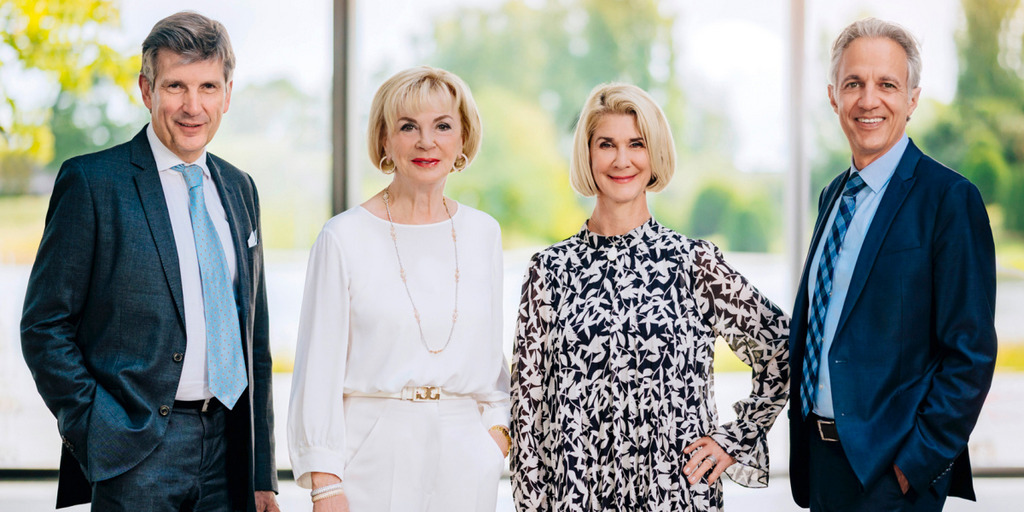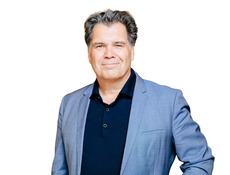Social cohesion, equitable opportunities and participation are more important in the crisis than ever before. That point was emphasized by Ralph Heck, the new chairman of the Bertelsmann Stiftung Executive Board, at the foundation's annual press conference in Gütersloh.

© Besim Mazhiqi (Archivfoto 09/2020)
Innovative and sustainable for social cohesion
The Bertelsmann Stiftung wants to provide people with prospects for the future, so they can emerge from the coronavirus crisis stronger than before. It will be using innovative approaches to counter the fears people have about the future. In doing so, it will focus on the challenging situation surrounding education and training for young people. Those were the plans announced by the foundation’s Executive Board at the 2021 annual press conference in Gütersloh.
The foundation wants to help make society fit for the future, especially now. It is our foundation's goal to provide people with viable prospects on how, together, we can emerge stronger from the coronavirus crisis. To that end, we feel a stable democracy and sustainable economy are of existential importance.
Ralph Heck, Vorstandsvorsitzender der Bertelsmann Stiftung
Since its founding in 1977, the Bertelsmann Stiftung has made €1.7 billion available for its nonprofit activities. In 2020, expenditures on its project work totaled approximately €74 million. Last year, the foundation employed 363 people.
The Bertelsmann Stiftung’s studies reveal how important it is in times of a pandemic for people to have hope for the future. The studies show where action must be taken: Although one publication to be released at the end of March confirms that, overall, social cohesion in Germany remained stable in 2020, the foundation's experts also ascertained that people’s fears of the future increased in the second half of 2020. In particular, a majority of individuals in difficult economic circumstances (56 percent) say they are very concerned about their future prospects. Fear of what the future will bring is especially prevalent among young people under 30.
"Focusing again on the strengths of our society and economy"
"The political, business and social spheres must work together to set the course for the future," said Liz Mohn, vice-chairwoman of the Bertelsmann Stiftung Executive Board, at the annual press conference in Gütersloh. "That is why I would like to consciously send a signal of renewal today, not least in light of the work we are doing here at the foundation. It is time that we again focus on the strengths of our society and economy."
The foundation is committed making use of innovative possibilities for participating, even in times of crisis – such as the digital Citizens' Dialogue held in October 2020. During the event organized by the Bertelsmann Stiftung, 100 Europeans from Italy, Lithuania, Ireland, Denmark and Germany came together over three days for a lively digital discussion of Europe’s future.
The Bertelsmann Stiftung repeatedly concentrates on groups that have difficultly participating in society. The initiative #StopptKinderarmut was widely acclaimed last year. The foundation is hoping for a similar success in the area of vocational training. The coronavirus crisis has upended the plans of many young people, which is why the Bertelsmann Stiftung is advocating for the government to provide a "training guarantee," based on the Austrian model, that would make it easier for young people to enter a regular training program. "It would also help reduce the shortage of skilled workers," said Jörg Dräger, member of the Bertelsmann Stiftung Executive Board. At the same time, he warned against reverting to pre-coronavirus mode in the educational sector once the pandemic is over. "We can now take advantage of the digitalization forced on everyone during the pandemic. Intelligent learning software makes it possible to learn more effectively: individually tailored to meet the needs of each student," he said.
Voting at 16 – letting young people have more of a say
Young people should be able to contribute their opinions at an earlier age – a change the foundation endorses as well. "Voting at 16 – that would have been an issue for the coming national elections," said Brigitte Mohn, member of the Bertelsmann Stiftung Executive Board. "That hope has been dashed, but the foundation remains committed to this change."
"No more business as usual," demanded Brigitte Mohn, meaning more than just the call to lower the voting age. "We need a nationwide, practical laboratory for more innovation," she said. "The hackathon #UpdateDeutschland could be the first step in this direction." At the latest during the coronavirus crisis, Germany found out what works well in the country and what does not. That’s why solutions are urgently being sought for social challenges. #UpdateDeutschland is allowing new ideas to be identified and innovative solutions to be developed. Communities, the state of North Rhine–Westphalia (NRW), universities, the Federal Chancellery, the city of Gütersloh and the Bertelsmann Stiftung will all be taking part as of March 19, when more than 1,000 participants begin discussing Germany’s future as part of this initiative.
Innovation remains an essential issue at the Bertelsmann Stiftung. On October 28, in the centenary year of the birth of its founder, Reinhard Mohn, the foundation will award the Reinhard Mohn Prize to Chemi Peres. The son of Nobel Peace Prize laureate Shimon Peres is the chairman of the Peres Center for Peace and Innovation in Tel Aviv. As a successful and socially responsible entrepreneur, he represents the "Innovation and Start-up Nation" of Israel.



